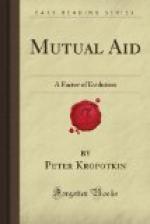And yet, as soon as the every-day life of man during the historical period is submitted to a closer analysis and so it has been, of late, by many patient students of very early institutions—it appears at once under quite a different aspect. Leaving aside the preconceived ideas of most historians and their pronounced predilection for the dramatic aspects of history, we see that the very documents they habitually peruse are such as to exaggerate the part of human life given to struggles and to underrate its peaceful moods. The bright and sunny days are lost sight of in the gales and storms. Even in our own time, the cumbersome records which we prepare for the future historian, in our Press, our law courts, our Government offices, and even in our fiction and poetry, suffer from the same one-sidedness. They hand down to posterity the most minute descriptions of every war, every battle and skirmish, every contest and act of violence, every kind of individual suffering; but they hardly bear any trace of the countless acts of mutual support and devotion which every one of us knows from his own experience; they hardly. take notice of what makes the very essence of our daily life—our social instincts and manners. No wonder, then, if the records of the past were so imperfect. The annalists of old never failed to chronicle the petty wars and calamities which harassed their contemporaries; but they paid no attention whatever to the life of the masses, although the masses chiefly used to toil peacefully while the few indulged in fighting. The epic poems, the inscriptions on monuments, the treaties of peace—nearly all historical documents bear the same character; they deal with breaches of peace, not with peace itself. So that the best-intentioned historian unconsciously draws a distorted picture of the times he endeavours to depict; and, to restore the real proportion between conflict and union, we are now bound to enter into a minute analysis of thousands of small facts and faint indications accidentally preserved in the relics of the past; to interpret them with the aid of comparative ethnology; and, after having heard so much about what used to divide men, to reconstruct stone by stone the institutions which used to unite them.
Ere long history will have to be re-written on new lines, so as to take into account these two currents of human life and to appreciate the part played by each of them in evolution. But in the meantime we may avail ourselves of the immense preparatory work recently done towards restoring the leading features of the second current, so much neglected. From the better-known periods of history we may take some illustrations of the life of the masses, in order to indicate the part played by mutual support during those periods; and, in so doing, we may dispense (for the sake of brevity) from going as far back as the Egyptian, or even the Greek and Roman antiquity. For, in fact, the evolution of mankind has not had




